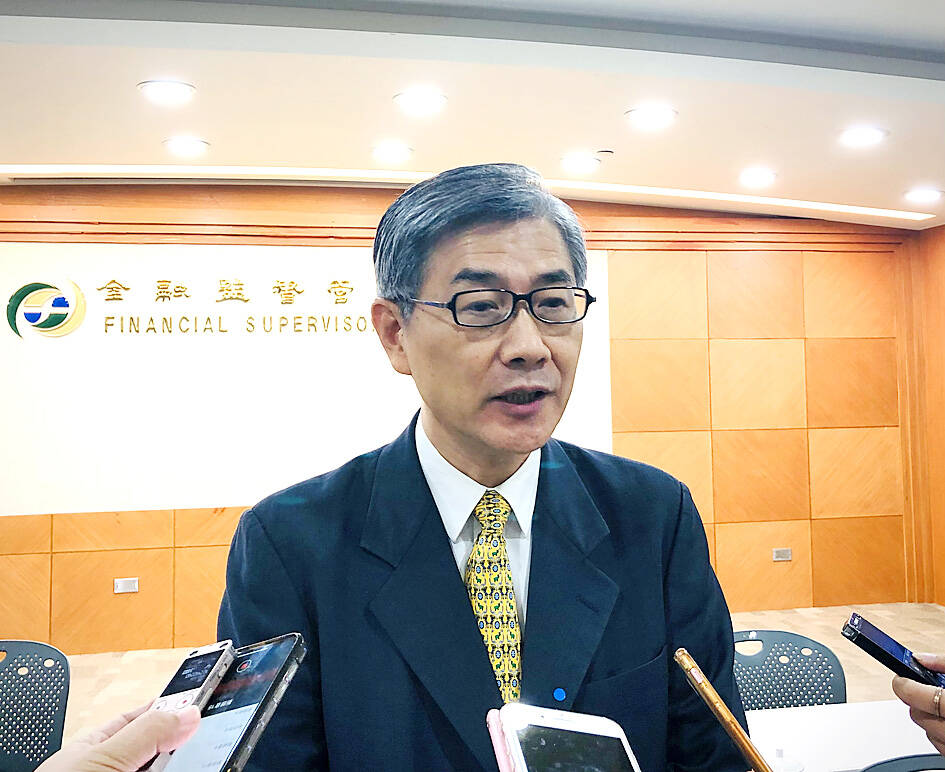Draft legislation proposed by the Financial Supervisory Commission (FSC) to curb major shareholders from improperly interfering in the operations of financial holding companies and banks would limit penalties on offenders to just fines, local media reported, citing commission officials.
The bill would also remove fines on persons in charge of financial holding companies and banks should improper interference by major shareholders occur, while retaining sanctions such as salary cuts, suspensions and dismissals, the officials said.
The FSC submitted the draft amendments to the Financial Holding Company Act (金融控股公司法) and the Banking Act (銀行法) to the Executive Yuan for review this month, they said.

Photo: Kelson Wang, Taipei Times
The commission expects the draft legislation to be considered among the priority bills that could be deliberated in the Legislative Yuan in the coming months, they said.
In a previous draft seen in April, the regulator proposed penalties against major shareholders who improperly interfered in the operations of a holding company or bank in the form of fines of up to NT$50 million (US$1.55 million), restrictions on their voting rights or requirements that they sell their shares.
The bill comes as several financial holding firms’ major shareholders were found to have improperly intervened in company operations by receiving information directly from management rather than from their representatives on the board, or by holding meetings outside the office with responsible executives.
Since last year, the commission has imposed sanctions on Shin Kong Financial Holding Co (新光金控), China Development Financial Holding Corp (中華開發金控) and CTBC Financial Holding Co (中信金控) for failing to comply with corporate governance requirements and keep those in power to behave properly.
The commission’s previous draft faced strong objections from the financial industry, with major shareholders criticizing the equity divestment penalties as infringing on their property rights, while executives of financial companies demanded that the principle of proportionality be observed regarding the fines of up to NT$50 million.
After discussions with legal experts and financial professionals over the past few months, the commission adjusted the scope of the penalties to ensure the legislation would pass smoothly, the officials said.
FSC Chairman Thomas Huang (黃天牧) has said that the commission hoped to receive public support by achieving its policy goal in stages.
It remains to be seen whether a fine of as high as NT$50 million can effectively constrain the conduct of major shareholders who seem to care less about money than power, analysts said.
What matters more are harsher penalties like voting rights restrictions and equity divestment requirements, they said.

When an apartment comes up for rent in Germany’s big cities, hundreds of prospective tenants often queue down the street to view it, but the acute shortage of affordable housing is getting scant attention ahead of today’s snap general election. “Housing is one of the main problems for people, but nobody talks about it, nobody takes it seriously,” said Andreas Ibel, president of Build Europe, an association representing housing developers. Migration and the sluggish economy top the list of voters’ concerns, but analysts say housing policy fails to break through as returns on investment take time to register, making the

NOT TO WORRY: Some people are concerned funds might continue moving out of the country, but the central bank said financial account outflows are not unusual in Taiwan Taiwan’s outbound investments hit a new high last year due to investments made by contract chipmaker Taiwan Semiconductor Manufacturing Co (TSMC, 台積電) and other major manufacturers to boost global expansion, the central bank said on Thursday. The net increase in outbound investments last year reached a record US$21.05 billion, while the net increase in outbound investments by Taiwanese residents reached a record US$31.98 billion, central bank data showed. Chen Fei-wen (陳斐紋), deputy director of the central bank’s Department of Economic Research, said the increase was largely due to TSMC’s efforts to expand production in the US and Japan. Investments by Vanguard International

WARNING SHOT: The US president has threatened to impose 25 percent tariffs on all imported vehicles, and similar or higher duties on pharmaceuticals and semiconductors US President Donald Trump on Wednesday suggested that a trade deal with China was “possible” — a key target in the US leader’s tariffs policy. The US in 2020 had already agreed to “a great trade deal with China” and a new deal was “possible,” Trump said. Trump said he expected Chinese President Xi Jinping (習近平) to visit the US, without giving a timeline for his trip. Trump also said that he was talking to China about TikTok, as the US seeks to broker a sale of the popular app owned by Chinese firm ByteDance Ltd (字節跳動). Trump last week said that he had

STRUGGLING TO SURVIVE: The group is proposing a consortium of investors, with Tesla as the largest backer, and possibly a minority investment by Hon Hai Precision Nissan Motor Co shares jumped after the Financial Times reported that a high-level Japanese group has drawn up plans to seek investment from Elon Musk’s Tesla Inc to aid the struggling automaker. The group believes the electric vehicle (EV) maker is interested in acquiring Nissan’s plants in the US, the newspaper reported, citing people it did not identify. The proposal envisions a consortium of investors, with Tesla as the largest backer, but also includes the possibility of a minority investment by Hon Hai Precision Industry Co (鴻海精密) to prevent a full takeover by the Apple supplier, the report said. The group is